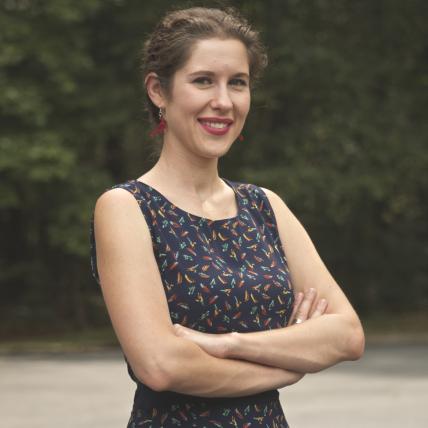Annegret arrived at the University of Washington after receiving her doctorate in May 2016. Originally from Zwickau, Germany, she came to the United States to obtain a Ph.D. degree in German at the University of North Carolina at Chapel Hill’s and Duke University’s combined graduate program. For her dissertation, she researched the adaptations and transformations of Wigalois, a text narrating the adventures of an Arthurian knight, across different languages (Yiddish and German) as well as across different media (manuscripts, prints, wall paintings, comics) from the 13th to the 21st centuries. Her dissertation showed how the Wigalois adaptations present a shared German-Yiddish narrative. She is currently in the process of revising this dissertation for book publication.
At the moment, she is also working on an article that focuses on the construction of identity in the works of Süßkind von Trimberg, a supposedly Jewish writer of Middle High German poetry. Annegret has previously explored the question of identity within a German-Jewish framework in an essay about an Early Yiddish Love and Adventure Novel from 16th ct. Italy, and another essay about the Yiddish adaptation of an Early New High German Novel and its connection to Spinoza’s philosophy.
Annegret received a B.A. in Jewish Studies and an M.A. in Medieval and Early Modern German Literature and Language from Freie Universität in Berlin. During her time in Berlin, she transliterated and edited Middle Dutch sermon tracts as a research assistant and worked as teaching assistant for Middle High German and medieval literature. During the first year of her M.A. studies, Annegret worked for a semester in London at the Wiener Library Institute of Contemporary History. She also lived for one year in Shavey Zion, Israel, where she volunteered at a guest house for survivors of the Shoah.
Annegret got interested in the relationship of Early German and Yiddish literature through a footnote. In 2009, while reading material for a paper about medieval German literature at the Freie Universität Berlin’s library, a footnote about old Yiddish literature caught her attention. A few days later, she found a copy of “Introduction to Old Yiddish Literature” by Jean Baumgarten at a second-hand book store, bought it, and read it from cover to cover. This book opened a whole new world to her. Early Yiddish Literature struck her as something that seemed like a white spot on a map, ready to be explored. Her motivation to explore this under-researched material and offer new insights on this fascinating field of literature is still inspiring her work.
At UW, she is currently teaching German 201 and “The History of the German Language,” a class that familiarizes students with the past of German, the potential future scenarios of the language development, and the place of German in a world of increased mobility and migration. Annegret is very excited about her class for Winter 2017, “Adapting Arthur: Retelling the Story of the Once and Future King,” in which she takes students on an exploration of German, French, English, Yiddish, and Hebrew retellings of the stories about King Arthur and his knights.
